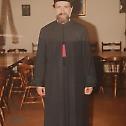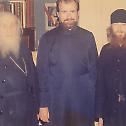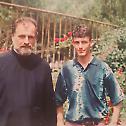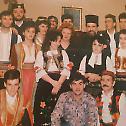Protopresbyter Periša Vranić (1944 – 2002)
You set before me the task of writing a few lines about my late father, Archpriest PerišaVranić, which made me very happy and for which I am grateful to you, but fully aware of my inability to answer the task set before me in the most comprehensive way. The very thought of my father evokes many wonderful memories from my childhood, even today I am not fully aware of where the border was between his priestly service and his parental service. Somehow it was inseparable with him. Mother Jelena, a professor of music, equally had a sacred role, not only to follow father's calling and be his support, but also to be a mother at home. A mother is a calling and a blessing, and she has always been a mother.
I was small, but I will never forget the family Akathists on my knees. Not because I understood and was pious, but because my father and mother did it naturally and regularly. As a family, we regularly read the Akathists to the Lord Christ, the Most Holy Mother of God, St. Basil of Ostrog and St. Nicholas of Myra, but Dad and Mom still had their own Akathists. Later I found out that they were Akathists to St.Petka, St. Xenia of St. Petersburg ... While we were reading on our knees, I would think more about the pain in my knees than about the text of Akathists, and my older brother Vasilije and I stammered reading because we were small, and the words of the prayers were long and complicated for us then. Mom and Dad waited patiently for us to finish out the prayer, and it seems to me that they prayed even better then. The youngest brother Nikola, even though he was a baby at the time, often overpowered us with his voice, and Vasilije and I could hardly wait for those moments, so that we would not be heard stuttering. I didn't understand then why all that was important, but now I know that prayer from children's mouths is very important.
When I mention my father, I can't help but mention religious education in the Old Church in Sarajevo, after the Liturgy where I served as an altar boy, and often sang with adults, and then hurried to the Cathedral Church, where the Liturgy began a little later, in order to help in the altar there as well. No, so small on my own I was not so zealous; it was simply taken for granted by my father. I loved helping in the altar, but it wasn't easy to be his helper. Even if others could make a mistake in the altar, I couldn’t. If others did not have to read the epistle, I did, often against my childish will and in tears. He knew that I was no better than the others, but I had to be very aware that I was the son of a priest. He obviously knew, and I still try to this very day to understand what that means.
PerišaVranić was born in Mirosaljci near Arilje in 1944 to pious parents Branko and BrankaVranić. In a very difficult time, the time of militant atheism and communism, the young Periša opted for the seminary, and immediately afterwards for the faculty in Belgrade, which he completed on time with exceptional success. Therefore, at the invitation of the Bishop of the Midwestern American Firmilijan, he went to America for two years for academic training. On the North American continent, he stayed in places where I myself stayed, either as a student or as a priest. Emotions always come especially when I know that I am in the places where he also stayed.
Upon his return to Serbia, Patriarch German himself of blessed memory, takes the young Periša as a clerk at the Patriarchate. Even as a layman, he started religious education and work with young people in Belgrade. Very soon, at the invitation of the Metropolitan of Dabro-Bosnia Vladislav, PerišaVranić moved to Sarajevo, where he was ordained to the rank of deacon, and a few years later to the rank of priest. The bishop loved him extraordinarily because of his dedication to the priestly service. From the beginning, he devoted himself to the renewal of spiritual life in Sarajevo, and he dedicated most of his activities to religious education and spiritual work with both young and old. The Lord multiplied his work many times through numerous spiritual children, both among those who are in the world, and among those who have decided to receive monastic vows, many of whom are exceptional clergymen of the Serbian Church.
Every year, at least once, groups of worshipers went from Sarajevo for a multi-day tour of the shrines in Kosovo and Metohija and Montenegro, the Ovčar-Kablar gorge and Belgrade. I loved those trips because of the wonderful people and socializing. Dad knew the places where the concrete pits were forgotten, where the Serbian people, in the justice of God, were thrown and left to die in the most terrible torments. Back then, during communism, these were places that were not easy to find. These were places left in oblivion. We little ones always complained about why the bus stopped every fifteen minutes, with still nowhere to park. But, even today, I remember that my father served a memorial service over each pit and told us, the passengers, about the unimaginable sufferings of our people. If they suffered, he said, then at least we can pray for them, so that someone would pray to God for us as well. His mission in the time of militant atheism dressed in communism was to prayerfully thank those who suffered for the faith and the people, but also to awaken the dormant consciousness on the spot, because it was really difficult to just count all the pits, let alone make memorials and landmarks everywhere. And such is only the recent history of the Serbian people.
I must mention that it always somehow weighed on me that my Grandpa Branko passed away young and that I did not have the opportunity to meet him. As a child, it was important to me that my father was alive. But I knew everything about my grandfather from my father’s stories. We regularly went from Sarajevo to visit Grandmother Branka and all the numerous relatives in Mirosaljci. We went to Grandpa's grave regularly, Dad served a memorial service, and we all sang as a family. Dad never missed an opportunity to tell us about Grandpa Branko, about whomhe said that, even if he didn't have much school, he had an innate folk wisdom that was obtained only through the school of life; that wisdom is passed down from generation to generation in our nation: Be a good Christian, be a good man, and do not lose even a fraction of your integrity.
As little ones, dad he would put us to sleep with the Holy Scriptures, and somehow I was especially impressed by the wonderful and instructive old world stories about Joseph and his brothers who envied him, as well as the story about righteous Job. Dad always told us that no matter what, God always finds a way to justify and reward those who are faithful to Him and who love Him.
The Lord endowed him with many talents and gifts. He loved the people and the people loved him, and with him the Church of God. But that caused contempt for him on the part of those who hated the Church, and envy among the over-ambitious fellows. I realized that it is not just a biblical story, it is a human reality. With his love for the Church and for his people, the sacrifice he was undergoing and made as a priest, he did not disappoint his father, but the concern remains whether we younger ones will manage to at least come close to his greatness. Have I grown up to the sacred call to which he has infused me with love, and which has been entrusted to me? Every time I stand with that question in front of the Holy Altar.
His physical strength began to give way abruptly in 2000, but his spirit, it seems to me, was getting more and more cheerful. I don't know if he knew anything more when he put us to sleep with the story of righteous Job, but he carried the illness calmly, quietly and, most importantly, spiritually ready. His true Job-like testimony to the very end of his earthly life seemed to be a living lesson to us, and it was not possible to learn that in the seminary, or in any other school. He passed away on February 7, 2002, and with the blessing of Serbian Patriarch Pavle, he was buried in the monastery of the Holy First Martyr and Archdeacon Stefan in Slanci near Belgrade, the Metochionof Hilandar monastery.
If there is an ideal of a priest, it is for me my late father, the priest PerišaVranić. I learned all the beauty of serving God through him and mother Jelena. The ideal of a priest and motherly love are the reason why I fell in love very early with and started the priestly service. While at the same time aware that I will probably never be able to approach the greatness of his personality and always having his bright example before my eyes, I can only strive as much as I can for the ideal of the sublime priestly rank that he has carried with such great dignity and love.If the earthly life of Father PerišaVranić, from a human point of view, was short, seeing how much fruit it brought, he seems to exclaim together with the great apostle Paul: I have fought a good fight, I have finished the race, I have kept the faith (2 Tim. 4:7), and we, seeing the work of God manifested through him, cannot but say: A good reason had he to be alive!… (Petar II PetrovićNjegoš) Горски Вијенац - Mountain’s Wreath
I could not give a eulogy over the bier of my late father, I was small, but it was done by Patriarch Pavle, of blessed memory. I thank you and Slovo magazine for making it possible, at least now, instead of a candle, to share my few modest thoughts about my late father, to whom I am eternally grateful, and whose prayers, it seems to me, feel more alive to us now than ever.
Protonamesnik Vladimir Vranić





